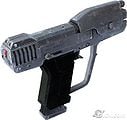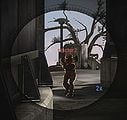M6G magnum: Difference between revisions
From Halopedia, the Halo wiki
No edit summary |
SPARTAN-118 (talk | contribs) m (Reverted edits by Undead elite (Talk) to last version by Smoke.) |
||
| Line 71: | Line 71: | ||
*Firing sound is different. | *Firing sound is different. | ||
*Different reload and melee animations. | *Different reload and melee animations. | ||
===Influences=== | ===Influences=== | ||
Revision as of 18:11, September 29, 2010
Template:New Content Template:Weapon The M6G Personal Defense Weapon System[1], abbreviated as M6G PDWS and commonly referred to as the M6G Magnum Sidearm, is a United Nations Space Command infantry firearm, and is one of the variants of Misriah Armory's M6 sidearm series.
Design Details
The M6G sidearm is a semi-automatic, recoil-operated, magazine-fed, large caliber handgun. It is a later model of the M6 series sidearms that was distributed to officers and vehicle/weapon crews.[1] The weapon has a polymer handle, along with a titanium alloy body and what appears to be an anti-corrosion nickel-plate finish. The sidearm fires the M225 SAP-HE (Semi-Armor Piercing, High Explosive) rounds from an 8-round magazine at a velocity of 427 m/sec (1302.35 ft/sec).
Performance wise, the M6G sidearm has a relatively low rate of fire, being able to deliver two rounds per second or 120 rounds per minute. It could achieve a maximum effective range of 50 meters and is very accurate and precise, proving itself to be the jack of all trades for close-to-medium range operation.
Ammunition
The M6G uses 12.7x40mm M225 SAP-HE (Semi-Armor Piercing, High Explosive) .50 Caliber ammunition loads. These rounds have a jacket of copper or cupro-nickel around the projectile while the projectile itself is hollow and filled with an explosive compound and a delayed-detonation impact fuse. When the round impacts a target, the jacket will initially help the projectile maintain its shape, allowing it to travel into the target before detonating almost immediately after impact, causing massive tissue damage and system shock. Probable reasons for using semi-armor piercing rounds instead of armor piercing projectiles are both to prevent over-penetration of hostiles and decreasing the risk of friendly fire during CQB and urban combat, and their devastating efficacy against soft targets. The explosive properties of the rounds render them decently effective against personal shielding systems and are also capable of damaging lightly-armored vehicles.
Advantages
The M6G is designed primarily for ruggedness and reliability. It is a very useful sidearm for close battles, and skirmishes. The UNSC has issued the M6 series of pistols as a standard sidearm because of its effectiveness against armor and shields, while retaining high impact force due to the high caliber and projectile mass. The M6G, like its predecessor the M6D, requires the same amount of skill to use, and a person who can effectually lead his shots, with a good understanding of how the weapon works will be able to take down targets with ease.
Disadvantages
The M6G, unlike the M6D, has a slower firing rate, and as such downing an enemy will take considerable time. If the person wielding it does not take into account of how the weapon works, or is unable to dodge enemy fire, they will be killed quickly by their opponent. Its eight-round magazine also puts the user at a disadvantage should a couple of rounds miss its target. A user must be precise and know at what range to engage the enemy or risk being killed.
Variants
The M6G comes in two variants, the 'B' variant, and the 'C' variant.[notes 1]
'B' variant
The 'B' variant is a semi-automatic, and is also capable of firing as fast as the operator can pull the trigger. It is issued with a smart-linked KFA-2 x2 scope, has a shorter, stockier barrel, a different slide and grip, and an electroless-nickel finish.
'C' variant
The 'C' variant is of the general same general size and proportions, with exception to a slightly longer barrel and is NOT issued with a smart-linked KFA-2 x2 scope, unlike the 'B' variant. Although still semi-automatic, the 'C' variant has a slower rate-of-fire than its counterpart, but has increased accuracy.[1]
Changes from Halo 3 to Halo: Reach
- Features a usuable KFA-2 x2 smart-linked scope under the barrel.
- Has reticule bloom, like most weapons in Halo: Reach.
- Higher rate of fire; about twice as fast.
- Has a differently designed slide, grip, and magazine.
- Slightly shorter barrel.
- Firing sound is different.
- Different reload and melee animations.
Influences
One possible influence is the Desert Eagle. Though their outward appearances are different, both weapons are of similar size and caliber, and the slide of the M6G comprises the rear of the frame instead of the entire upper area, common with the Eagle. Another likely candidate is the H&K P7 series or the Steyr M. Another possible influence on the design of this weapon was the FP-45 Liberator, a weapon designed in the United States during World War II. The long handle, but short barrel is an obvious feature.
Tactics
Campaign
- The M6G is quite useful against most sparse targets that are encountered throughout diverse combat. Enemies such as Grunts and Jackals can be quickly dispatched with one well-placed shot to the head and enemies like Drones and members of the Flood can be dispatched in as little as 1-2 well-placed shots. The same can be applied to unshielded Brutes with one well-placed shot to the head.
- The M6G's high-caliber rounds give it the ability to stumble non-berserk, unshielded enemies. This is most effective fired at the feet, when enemies like Brutes suffer the longest injury recovery time.
Multiplayer
- Wielding a pair of Magnums performs quite well against shielded targets, but is restricted due to their rate of fire. Dual-wielding a Magnum with other weapons such as an M7/Caseless Submachine Gun or a Type-25 Directed Energy Pistol is also quite effective as the SMG depletes shielding quickly, while the Magnum finishes the target off; a Plasma Pistol's charged shot will completely drain any shielding system allowing the Magnum to perform the lethal head shot.
Trivia
- Like the M6D, the M6G has Asian calligraphy stamped on the barrel, but in this case, they are Korean Hangul, not Japanese Kanji. It is also featured on the bottom of the magazine. The symbol 일곱 (il-gohb) , when reflected, translates to 7.
- The words 'Misriah Armory' are written on the side. Similarly, the M6G has a Marathon symbol on the grip near the back.
- Aesthetically, the M6G seems to be a combination of M6C's way of being held, and the M6D look and structure.
- It is incorrectly labeled in the instruction manual as having 12 rounds per magazine, instead of the actual 8.
- Unlike the M6D, when a full magazine is emptied, the slide of the M6G does not lock back to wait for another fresh magazine to be inserted.
- It costs 1615 cR. to make one Magnum pistol, more than a Flamethrower, which costs 1520 cR.
- A single M6G shot does 15 damage points to a player, based on the 115 hit points a player is given (70 shielding points, and 45 body points).
- The M6G pistol does about twice as much damage as the MA5C Assault Rifle; on Heroic difficulty, a human Marine dies after 24 assault rifle shots, or after 12 pistol shots.
- A shot from the M6G pistol is marginally less damaging than a 3-round burst from the Battle rifle; it takes 12 pistol shots or 10 3-round bursts from the Battle Rifle to kill a human Marine on Heroic difficulty.
- In an old poster related to the human weapons of Halo 3, the M6G is incorrectly labeled as an M6C.
- This variant of the M6 appears to be a homage to the 44 Magnum Pistol in Marathon. Using the same number of rounds per magazine, the same rate of fire and duel wield capability and sporting an unusable attachment (44 with its scope and M6G with its laser sight). Even the reload time is the same.
- The M6G in Halo: Reach has a nearly identical melee animation to the M6D pistol in Halo: Combat Evolved.
Gallery
- M6G Pistol One Handed.jpg
A Marine holding the M6G.
- Magnum Reticle.svg
The reticule of the M6G.
- HaloReach - M6G.png
Side profile of the M6G ('B' variant) as seen in Halo: Reach.
Notes
- ^ The conflicting visuals printed on Halo 3's M6G and Halo: Reach's M6G lead to the assumption that the sidearms used in both games are of two different sub-models. This is, however, based off visual evidences gathered from Halo: Reach Multiplayer Beta and will likely change in the final product.


